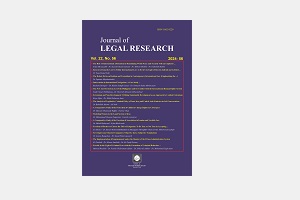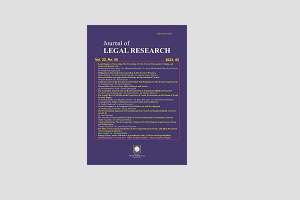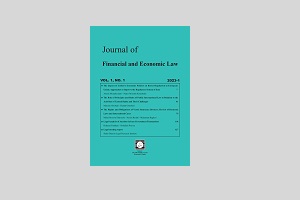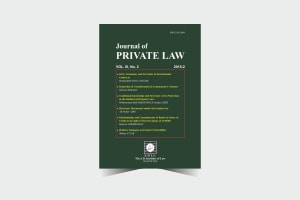Journal of
Legal Research
Number 6
Vol. III No. 2
Autumn 2004 – Winter 2005
Managing Editor: Vahid Eshtiagh
Editor-in-Chief: Seyyed Ghasem Zamani
Contents
Articles
Belgium and the End of a Ten Years Dream of Universal Jurisdiction over International Crimes
Ali Khaleghi (Ph.D.)
Intervention of Judges for Controlling of Laws in Comparing to Constitution (Comparative Law & Iran)
Abdollah Khodabakhshi Shalamzari & Nayyereh Abedinzadeh Shahri
Security Council and Referral of the Situation in Darfur (Sudan) to the International Criminal Court
Seyed Ghasem Zamani (Ph.D.)
Legal Analysing of the Iran-EU Agreement on Nuclear Program
Seyed Hossein Sadat Meidani
National Implementation of International Law and the Role of Iranian Courts
Nader Saed (Ph.D.)
Special Issue: Combatting of the Criminal Law
against Economic Offences
Comparative Approach to crime of Bribery in the Legal Systems of France, Italy, Switzerland and China
Seyed Hossein Hosseini (Ph.D.)
Necessity of Extending the Punishment of bribee to Non- Governmental Sectors in the Iran’s Criminal Code
Vahid Eshtiagh (Ph.D.)
Bankruptcy Fraud
Mansoor Rahmdel (Ph.D.)
Considering Legal Aspects of Insider Trading in Security Markets (A Comparative study)
Seyed Elhamedin Sharifi (Ph.D.)
Computer Fraud
Hasan álipour
Report and Critique
Reflections on Proposed Draft of the Ministry of Commerce for Amendments of Iran’s Commercial Code
Behrooz Akhlaghi (Ph.D.)
A More Secure World: Our Shared Responsibility (The report of the High-Level UN Panel on Threats, Challenges and Change)
Amir Saed Vakil
Articles
Belgium and the End of a Ten Years Dream
of Universal Jurisdiction over International Crimes
Ali Khaleghi (Ph.D.)
Abstract:
In 1993 and 1999 Belgium has recognised its universal jurisdiction over
international crimes in order to prosecute the offenders in its tribunals.
Facing with the problems arising from application of its absolute universal
jurisdiction, Belgium has revised its legislation and limited and then
omitted this large jurisdiction. The present article examines these laws and
the its problems.
Intervention of Judges for Controlling of Laws in Comparing
to the Constitution (Comparative Law & Iran)
A. Khodabakhshi Shalamzari & N. Abedinzadeh Shahri
Abstract:
Intervention of Judges for controlling of laws in comparing to constitution
differ from country to other country. “Political control” and “Judicial
review” are two method for this aim. In Iran, forecast of “shuraye
neghahban”, according to one opinion, forbid Judges from controlling of
law and declaring of contradiction to constitution. In contrast with the
opinion, we support the view that foresee rights and obligations of judges
for this control.
Security Council and Referral of the Situation in Darfur
(Sudan) to the International Criminal Court
Seyed Ghasem Zamani (Ph.D.)
Abstract:
Security council on 31 March 2005, acting under chapter VII of the UN
Charter, adopted Resolution 1593 referring the Darfur situation to the
International Criminal Court. It is for the first time that the security
council referred a situation to ICC.
The International Commission of Inquiry on violations of international
humanitarian law and human rights law in Darfur confirmed that mass
violations of human rights and international humanitarian law have taken
place in Darfur. It recommended, given the circumstances the referral of
situation to ICC which is the sole body with jurisdiction which can
impartially, effectively and rapidly bring to trial those who bear major
responsibility for those crimes.
Legal Analysing of the Iran-EU Agreement
on Nuclear Program
Seyed Hossein Sadat Meidani
Abstract:
Islamic Republic of Iran and three European countries (France, Germany
and England) Signed Paris Agreement on Iran’s Nuclear Program on 14
November 2004. This article examines the agreement from legal points of
view.
National Implementation of International Law
and the Role of Iranian Courts
Nader Saed (Ph.D.)
Abstract:
The main issue discussed this article is the role of Iranian Judiciary in
implementation of international conventional and customary obligations.
The argues that the Iranian judiciary and its judges ought act their legal
duty i.e.: settlement of disputes and punishment of unlawful behaviors
within law framework, based on both domestic and international laws.
However, the Iranian legal system has not completely developed in this
aspect. In spite of art. 9 of Iranian Civil Code on acceptance legally
binding force of treaties ratified by Iranian parliament, the status of
international customary obligations of the state and their implementation
by the courts is not clear. The author in particular in the light of
international responsibility, believes that implementation of international
legally binding obligations in internal courts, is an established rule in the
contemporary international law. Therefore, the Iranian legal system shall
be developed in this case. The new Jurisprudence of a Tehran Public Court
on obligatory status of implementation of the United Nations Charter and
the relevant Security Council Resolutions for the Iranian courts has a legal
consequence of its acceptance in the parliament, is the main focus here.
Comparative Approach to crime of Bribery in the Legal
Systems of France, Italy, Switzerland and China
Seyed Hossein Hosseini (Ph.D.)
Today, the crime of bribery is a national, regional and international serious
problem for any legal system. Many European and Asian countries such as
France, Italy, Switzerland and China have considered bribery as a crime
against Justice and public administration.
Comparative studying illustrates that there are many similarities and some
differences among the criminal legal systems on elements of the crime of
bribery and appropriate responses to it.
Necessity of Extending the Punishment of bribe to Non-Governmental Sector in the Iran’s Criminal Code
Vahid Eshtiagh (Ph.D.)
In many countries it has been considered bribery for anyone to give or
receive anything of value or any valuable service or promise with the intent
to influence any person in the discharge of a legal duty. However in the
Iranian Criminal System it isn’t considered as a criminal conduct for
persons other than public servants to recieve bribery.
Bankruptcy Fraud
Mansoor Rahmdel (Ph.D.)
Bankruptcy Fraud is one of the crimes which has been referred to it in Commercial Code but it’s punishment has been determined in the Penal Code. A Fraud Bankrupt is a merchant who is not in fact Bankrupt but
pretends to Bankruptcy by using fraud. The forms of using fraud have been
calculated in section 549 of the Commercial Code. So, we can say that the
Penal Code has followed the Trade Code from the point view of the Actus
Reus.
Considering Legal Aspects of Insider Trading in Security
Markets (A Comparative study)
Seyed Elhamedin Sharifi (Ph.D.)
Investor Confidence in security markets depends the assurance afforded to
investor that they are placed on an equal footing and that they will be
protected against the improper use of Inside information. The aim of the
insider Trading Law should not be to eliminate all information advantages,
but to proscribe those advantages whose use would be improper, because
their acquisition was not the result of skill or effort but of the mere fact of
holding a particular position.
The article aims to clarify elements of insider trading and prohibitions
applicable to insiders. Then, the criminal nature of insider trading and it’s
effects to the contract will be discussed.
Computer Fraud
Hasan álipour
Once computers became common in today’s society, criminals began to
employ them to commit a variety of offenses. The phrase “computer fraud”
is used to describe stealing money or property by means of a computer:
that is, using a computer to obtain dishonestly, property or credit or
services or evade dishonestly some dept or liability.





